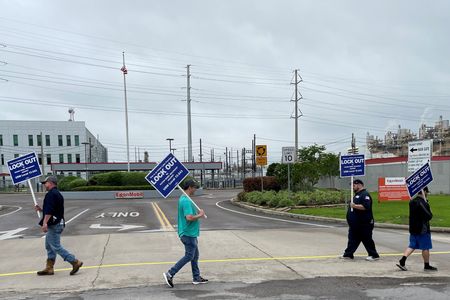By Erwin Seba
HOUSTON (Reuters) – A 10-month lockout of union workers at an Exxon Mobil refinery was undertaken to save costs and improve profits at the Beaumont, Texas, facility, and not to eliminate union representation, an Exxon Mobil official told an administrative judge on Monday.
The National Labor Relations Board (NLRB) last year called for the company to compensate the facility’s roughly 650 workers for wage losses during what it called an “unlawful” 10-month lockout.
An Exxon spokesperson called the complaint “an attempt to overturn decades of labor law and Supreme Court precedent,” and said Exxon expects to prevail. Exxon could face millions of dollars in back pay for the hourly workers. The NLRB judge is due to rule after hearing from the company and United Steelworkers’ officials.
Union representatives are to testify this week. In the past, they have argued that the lockout was unnecessary and designed to decertify, or throw out, the union at the plant.
“Decertification was never a factor in the lockout,” Exxon attorney Eva Shih said in opening remarks to Administrative Law Judge Jeffrey Wedekind. Operating losses at the facility and prior costs for replacement workers in earlier negotiations were behind the lockout and demand for job and contract term changes, she said.
The company had paid about $30 million to have employees on standby for four months after the prior contract talks dragged on in 2015, she said.
In 2020, as the company began preparing for the subsequent contract, Exxon decided it “couldn’t run in EMCO mode again,” Shih said, referring to the standby workers.
That same year, Exxon lost $22 billion overall, in part because of the loss of demand for its oil and motor fuels from lockdowns and work-from-home programs tied to halting the spread of COVID-19, she said.
In the planning for the 2021 talks, the company managers “discussed having to execute an offensive lockout as they knew bargaining was going to be contentious,” Shih said. “The company could not accept the costs and dangers of a possible strike.”
She said it was unprecedented for Exxon to lock out workers in the absence of a strike. But potential processing unit shutdowns and start-ups that might come from a strike represented high risk.
The union had issued a notice of a possible strike as early as May 1, 2021, and the company threatened to lock out workers on that date. The union did not call a strike, but Exxon launched the lockout.
The company also felt it needed to cut costs, Shih said. In 2012, the Beaumont refinery had the worst financial performance of the company’s refineries and faced a potential sale. Exxon gave plant managers instructions to improve performance in order to be considered for a $2 billion expansion that is now starting up.
(Reporting by Erwin Seba in Houston; Editing by Leslie Adler)

